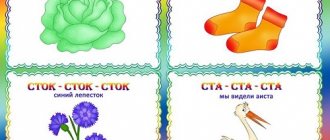In our country, over thirty percent of first-graders have speech pathologies - some have a very small vocabulary, others pronounce sounds incorrectly, and some first-graders have impaired articulation. Various tongue twisters and tongue twisters help to cope with speech defects. The most difficult tongue twisters, if you learn to pronounce them quickly and correctly, help correct speech disorders and allow the child to speak correctly. Let's find out which tongue twisters are great for developing children's speech.
About the benefits of tongue twisters
Tongue twisters (pure twisters) are works of folk art, funny phrases and rhymes invented by people in order to improve articulation and correct individual diction defects. They consist of a certain number of words with many of the same sounds, which makes them difficult to pronounce.
The phrases found in the tongue twister “Liguria” are inconvenient to pronounce, therefore they are good training for the articulatory apparatus, forcing the speech organs to work hard, improving their functions. The Liguria tongue twister will help you practice so that after it even the most complex text will come out of your mouth easily and freely, every sound will be heard, which means your pronunciation will significantly improve.
Additional exercises
Demosthenes is considered one of the most famous orators of the ancient world (384-322 BC). He managed to achieve outstanding results despite the fact that since childhood he suffered from tongue-tied speech (slurred speech), had a weak voice and short breathing. Plus to this whole set, Demosthenes had a habit of twitching his shoulder. To learn to pronounce words clearly, he made speeches with stones in his mouth. A similar method of speech training is still used today.
- Read the tongue twisters by putting a few nuts in your mouth.
- You can read tongue twisters while holding a wine cork or an ordinary pencil between your teeth.
- Try to pronounce the words as clearly as possible. To evaluate the quality of pronunciation, record the sound on a computer or voice recorder and then listen to it. It will be possible to compare speech intelligibility on the first day of class and after a certain period of time, for example two weeks.
They say that such exercises can significantly improve speech diction in a short time. Let's check.
Tongue twister "Liguria"
Speech specialists, speech therapists, and linguists recommend using the tongue twister “Liguria” to train the pronunciation of various phonemes (speech sounds). It will be interesting for both children and adults. With the help of a tongue twister, a student adapts his speech apparatus to the peculiarities of the language, learns to correctly pronounce sounds in complex phrases, and trains diction.
The tongue twister “Liguria” is a long and complex tongue twister that not everyone manages to learn by heart. But if after many trainings you can at least read a tongue twister at a fast pace, you will notice obvious and very significant changes in diction. To practice intelligible, fast and correct pronunciation, the Liguria tongue twister is successfully used by many artists, radio and television announcers, teachers, politicians, and businessmen.
Why did this wonderful tongue twister get such a name? Yes, because it is about “Liguria” - a cozy and very picturesque place in Italy. This is a funny patter about a traffic controller who regulated in Liguria. Repeat it with your children as often as possible, and problems with diction will disappear. Engage in systematic pronunciation training using the Liguria tongue twister.
Why is it so hard to pronounce
Linguists from the Massachusetts Institute of Technology tried to understand what happens to the speech areas of the brain during the pronunciation of tongue twisters. And they came to the conclusion that difficulties arise when a person tries to pronounce two sounds at once almost simultaneously. This double attack creates a “delay” in brain function. Groups of neurons responsible for the pronunciation of sounds that alternate in tongue twisters, at this moment approach each other at a critical distance. And in fact, they begin to interfere with each other by sending signals.
The most difficult proverb in the English language was recognized as: “pad kid poured curd pulled cod.” One of the volunteers tried to pronounce it, then could not utter a word for some time.
And among the linguists in Russian there are many that are difficult to pronounce. It is difficult for them to share the palm. Perhaps everyone can remember their own saying that is difficult for them.
Text of the tongue twister "Liguria"
On Thursday the 4th, at 4 and a quarter o'clock, the Ligurian traffic controller was regulating in Liguria, but 33 ships tacked, tacked, but never managed, and then the protocol about the protocol was recorded by the protocol, as the interviewed Ligurian traffic controller was eloquent, but not clear reported, and so reported about the wet weather that, so that the incident did not become a candidate for a judicial precedent, the Ligurian traffic controller acclimatized in unconstitutional Constantinople, where the tufted laughter laughed and shouted to the Turk, who was blackly stoned with a pipe: don’t smoke, Turk, pipe, better buy a pile peak, it’s better to buy a pile of peak, otherwise a bombardier from Brandeburg will come and bombard him with bombs because some black-snouted guy dug up half his yard with his snout, dug up and dug up; but in fact the Turk was not in the business, and Klara the King was sneaking to the stall at that time, while Karl was stealing corals from Klara, for which Klara stole the clarinet from Karl, and then in the yard of the tar widow Varvara, 2 of these thieves stole firewood; but it’s a sin - not laughter - not to put it in a nut: about Clara and Karl in the darkness, all the crayfish were noisy in a fight - so the thieves had no time for the bombardier, but also not the tar widow, and not the tar children; but the angry widow put the firewood in the barn: once firewood, 2 firewood, 3 firewood - all the firewood could not fit, and 2 woodcutters, 2 woodcutters, for the emotional Varvara, expelled the firewood across the width of the yard back to the wood yard, where the heron withered, the heron withered, the heron died; the heron's chick clung tenaciously to the chain; well done against the sheep, and against the well done the sheep itself, to which Senya carries the hay in a sleigh, then Senka carries Sonya and Sanka on a sled: the sled hops, Senka sideways, Sonya head on, everything into a snowdrift, and from there only a head of bumps knocked him down, then Sasha went along the highway, Sasha found the sachet on the highway; Sonya - Sashka’s friend was walking along the highway and sucking a dryer, and besides, Sonya the turntable also had 3 cheesecakes in her mouth - exactly like a honey cake, but she had no time for a honey cake - Sonya, with the cheesecakes in her mouth, would over-mix the sexton, - over-mix: it buzzes like ground beetle, buzzing and spinning: was at Frol's - Frol lied about Lavra, will go to Lavra at Frol Lavra will lie that - the sergeant with the sergeant, the captain with the captain, the snake has a snake, the hedgehog has a hedgehog, and a high-ranking guest has taken away from him a cane, and soon again 5 guys ate 5 honey mushrooms and a half-quarter of a quadruple of lentils without a wormhole, and 1666 pies with cottage cheese from whey from yogurt - about all of that, the bells were ringing with groans, so much so that even Konstantin - a Salzburg unpromising man from - under an armored personnel carrier he stated: just as all the bells cannot be re-ringed, all the tongue twisters cannot be repeated, all the tongue twisters cannot be re-spoken; but trying is not torture.
If you don't believe that the tongue twister "Liguria" can be pronounced, watch the video at the top of the page. Happy training! :)
Macaque and koala
The infrequently used tongue twister about Macaque is sure to please children. Here is a difficult to pronounce alternation of the sounds “M”, “L” and “K”:
A macaque met a koala in a cafe. Macaque koala dipped in cocoa, Koala lazily lapped cocoa, Macaque dipped, koala ikala.
Such a clean phrase is designed to emphasize the pronunciation of “L”, which not all children succeed in, there is no clarity. But so that parents themselves do not feel ashamed in front of their child, it is worth learning to pronounce without mistakes themselves. In case of a fiasco, you can laugh together.
Accents in the Ligurian tongue twister
In order for the longest tongue twister “Liguria” to benefit you and become an excellent help for the development of the articulatory apparatus, it is very important to read it correctly. After all, it’s not enough to clearly and distinctly say “on Thursday the fourth” or about how ships maneuvered somewhere there. It is important to understand the meaning and essence of the text from the tongue twisters, and here you cannot do without some explanations. In addition, such comments will make your speech more correct and competent. After all, today many people distort accents.
So here are some important notes about accent placement in Liguria:
- “Sasha” - emphasis on the second vowel, since we are not talking about a name, but about a pillow with a scent to repel moths;
- In the words “sergeant” and “captain”, which denote military ranks, the emphasis is on the first syllable;
- In the phrase “tar widow” the emphasis is also on the first vowel.
On a note! In any word with the letter “E” the emphasis is always placed on it.
It is also worth noting that the stress falls on the first syllable in the word “creeped”, but when pronouncing the name of the city “Barndenburg”, the emphasis should be shifted to the sound “u”, since according to the rules of the Russian language this word is read in this way. The “y” is also emphasized when denoting Liguria itself.
Note! Liguria is not only the name of the proposed text for the development of diction, but also the region of Italy.
When working on a long tongue twister, pay attention to the reading of the word “sexton”. Here the emphasis is on the very last sound.
When you read Liguria, read the names correctly. Here you may have a hitch with the words “Frola, Frolu.” It is worth mentioning right away that the interpretation of the correct pronunciation of this name in various sources may differ from each other. But don't forget the rules and their exceptions. In the names Peter, Frol, Lev, the emphasis is on the last syllable.
Of course, such a big tongue twister about Liguria, as it is commonly called, will not be “given” to you just like that. After all, some of the words in it are outdated; today they are practically not found in our everyday life - hence the main difficulties.
We recommend reading: The most difficult tongue twisters
The latest tongue twisters for children and adults
It is worth sharing tongue twisters that have not yet found widespread use due to their complexity. Let's try to say it right now:
- Nadezhda does not want old clothes, as before, but hope for new clothes attracts Nadezhda.
- Prokol Polukarpenko told the general about Prokolukarpenko from Pokrov.
- The courteous Chukchi honors the feelings of others; learn from the Chukchi to feel more sensitively.
- In the port of Madras, where the longboat arrived, the albatrosses tore the sailor's mattress.
- The beggar rustles in thousands and fifty thousandths.
- Deftly maneuvering in laryngology, the laryngologist easily cured laryngitis.
It’s interesting that some people have no difficulty pronouncing such phrases, while others cannot repeat them either the first or the second time.
How to pronounce difficult to pronounce phrases
In order to practice pronunciation of lingual tongues both humorously and usefully, you should follow the rules:
- At first, just read to visually remember the words.
- Repeat slowly twice and remember.
- Speak faster, trying not to make mistakes in the correct sounds. Don’t confuse where the hard sound “M” is and where the soft sound is – “mom washed Mila with soap...”. Do not confuse the sounds, so as not to end up with an indecent word - “There is a hill with sacks near the road. If I go out onto the hill, I’ll straighten the sack.” “I drive through potholes, I can’t get out of potholes.”
The brain will persistently rearrange sounds, forcing you to pronounce not quite decent phrases. And now you need to repeat it quickly and so several times. If it works, great! You have reached your goal. But it didn’t work out, they made everyone laugh, and that’s great too!
Tongue rollers for adults
For adults, tongue twisters are different. Some words may be incomprehensible to young children, but quite understandable to teenagers. And more, after all, they are aimed at concentrating attention, as well as warming up the speech apparatus. For example:
- “The interviewer of the intervert interviewed about the intervention.”
- “I am a helicopter. I can spin out, I can spin out.”
- “The rhododendrons from the arboretum are real, but the tree-like dendroids were not discovered by the radio-controlled drone.”
- "In Kabardino-Balkaria, valocordin from Bulgaria."
The Russian language can have such tricky phrases. Difficult to pronounce, they are not even easy to read. Here's another example:
- “A sorcerer practiced magic in a stable with the wise men.”
- “The queen invited the gentleman into the caravel: gentleman, gentleman, the rug was burnt.”
Some phrases will be difficult for a preschooler to understand, and there is no point in understanding them. That's why such tongue twisters are for artists, announcers and presenters. And also for those who just want to surprise their friends.
Useful tips
In order to bring the clear pronunciation of the largest tongue twister , you should train your sluggish articulatory apparatus daily:
- touch the tip of your tongue first to the upper lip and then to the lower lip (repeat alternately 20 times);
- try to blow away dust particles with outstretched lips;
- open your mouth as wide as possible, take out your tongue, lifting its tip and making it like a cup;
- put your tongue on your lower lip and hold it there for a while;
- move your tongue to the right and then to the left, imitating a clock walker (repeat 40 times);
- bite the tip of your tongue, pronouncing the syllable “ta” (for 30 seconds);
- alternately run your tongue across the palate, upper teeth and lip;
- smile widely for 15 seconds.
It is convenient to monitor the results through a voice recorder or video recording. This way you can work on errors and eliminate problematic issues.
How to learn “Liguria” in 7 days?
Surely, many have tried more than once to learn the longest tongue twister in the world, but the phrase “the Ligurian traffic controller was regulating...” the process was slowed down. Few people have the patience and perseverance to master this, at first glance, not so long verse (compare at least with “Borodino”).
It is important not only to know the order of words in the text, but also to pronounce them correctly and place emphasis. The difficulty of Liguria is that phonemes need to be pronounced at a fast pace. Do you think this is unrealistic?
It turns out there is no special secret in Liguria. You just need to learn it in a certain way and gradually. Don't be alarmed. You don't need to devote months or years to this activity, just one week is enough.
So, let's look at the simplest plan for learning Liguria that is accessible to everyone.
- Day No1. Print out the text of the tongue twister and read it very slowly for 15-20 minutes. Mentally imagine the picture and events discussed in the poem. All words must be pronounced clearly and the correct emphasis must be placed.
- Day No2. Continue reading the tongue twister for 15-20 minutes, but speed up the pace of speech a little.
- Day No3. Now you will need a little more time. Learn the following lines by heart. Here is the text: “On Thursday the fourth, at four and a quarter o’clock, the Ligurian traffic controller was regulating in Liguria, but thirty-three ships tacked, maneuvered, and never got caught, and then the protocol about the protocol was recorded by the protocol, as the interviewed Ligurian traffic controller spoke loudly , but he didn’t report cleanly, but he reported about the wet weather in such a way that the incident would not become a candidate for a judicial precedent.” Repeat the beginning of the tongue twister from memory, and continue reading the rest.
- Day No4. We are learning new 15 lines. We recite 30 lines of Liguria from memory, and quickly read the rest. The lesson will take you 40-50 minutes.
- Day No5. We repeat yesterday with the addition of 15 new lines we learned.
- Day No6. We learn the end of the tongue twister by heart. We repeat all 60 lines at an average pace for 40 minutes. Try not to peek at the text. Liguria's words should already be firmly entrenched in your memory.
- Day No7. By the end of the week, you already know the tongue twister by heart. All that remains is to improve your pronunciation and speed up your speech rate as much as possible. This workout will take you no more than 15 minutes.
If you strictly follow the recommendations presented above, tongue twister for improving diction will not seem like something scary to you. Spend just 50-60 minutes studying every day, and your friends and colleagues will very soon notice how much your speech has improved.
Turn Liguria lessons into a fun family game. Compare your results and the results of your loved ones, reward the winners with small prizes.










